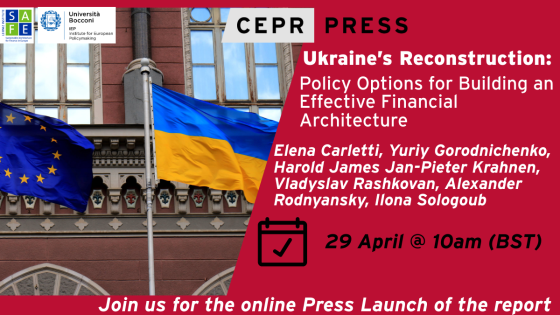


Search the site

A new CEPR report presents an ambitious reform programme for Ukraine’s financial sector, one that will provide a firm foundation for the country’s post-war reconstruction.
The Press Launch of the CEPR Ukraine Reconstruction: Policy Options for Building an Effective Financial Architecture took place on Monday, 29 April 2024 at 11 AM (CEST), 10 AM (BST). The editors introduced the eBook, followed by presentations by chapter authors.
The team of authors – which combines leading Ukrainian economists with experts from the Centre for Economic Policy Research RPN on European Financial Architecture – provide both the rationale and the implementation plan for building an effective, competitive and widely trusted financial system. As they explain, the rebuilt system should live up to recognised standards of integrity, be compliant with the EU accession process, and assume a recognised role in Europe’s banking and capital market unions.
A key message of the report is the value of establishing three institutions, partly based on existing institutions, in order to strengthen and widen Ukrainian ownership of the reconstruction and reform process:
First, a National Reconstruction and Reform Council (NRRC) should be established that develops and communicates a broadly shared vision for reconstruction, strives for agreement on the reform agenda and monitors its implementation.
Second, a Ukraine Development Bank (UDB) could leverage the capacity of existing banks in the country’s reconstruction and ambition to build back better. The UDB would raise capital in the markets to finance programmes (machinery, energy, housing) by entering into co-financing deals with existing banks, thereby leveraging their ability to invest. Moreover, the UDB would lend to sub-sovereign entities carrying out infrastructure projects (roads, rails, reconstruction). The UDB is envisioned as an institution co-owned by national and multilateral development banks, to ensure world- class practices as well as access to cheaper capital in international markets.
Third, a Ukraine Development Platform (UDP) would be a multilateral venture, with strong Ukraine ownership, that is dedicated to strategic planning and donor coordination relating to the reconstruction effort during and after the war. The government would put projects on the platform for multilateral and bilateral development banks to explore how they could collaborate. The UDP would also promote core standards to be applied to projects and encourage development institutions to come together in financing individual projects.
Together, the UDB and the UDP should be capable of facilitating Ukrainian banks’ access to international capital flows, while the NRRC would help to ensure a broad consensus within Ukrainian society for the reform agenda.
The report outlines five principles that should underpin a new financial architecture for Ukraine:
Professor Elena Carletti of Bocconi University in Milan, one of the report’s author’s, comments:
‘A well-designed financial sector – the whole of banks, capital markets, insurance, mortgages, financial regulation and supervision – can play a catalytic role in Ukraine’s reconstruction.
‘Preparing for EU accession can help to steer that process and build confidence among investors and the public, at home and in the international community.’
Co-author Professor Jan-Pieter Krahnen of Goethe University Frankfurt adds:
‘Building trust in the financial system requires knowledge of Ukraine as a country, its history, its institutions, its policies and its people, but also an understanding of the international experience from reconstruction and reform of war-torn economies.
‘Our author team, half of whom are of Ukrainian nationality, hope that we have a critical mass of both familiarity with local conditions and international experience that allows us to derive relevant conclusions and to develop useful proposals.’


